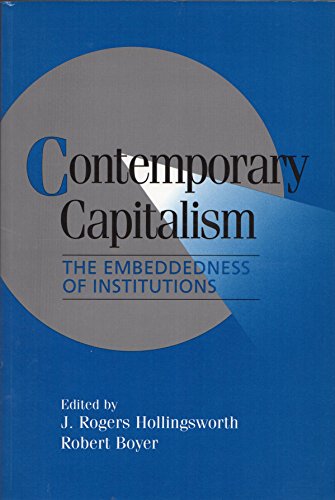Items related to Contemporary Capitalism: The Embeddedness of Institutions...
Contemporary Capitalism: The Embeddedness of Institutions (Cambridge Studies in Comparative Politics) - Softcover

Synopsis
This book argues that there is no single best institutional arrangement for organizing modern societies. Therefore, the market should not be considered the ideal and universal arrangement for coordinating economic activity. Instead, the editors argue, the economic institutions of capitalism exhibit a large variety of objectives and tools that complement each other and can not work in isolation. The various chapters of the book ask what logics and functions institutions follow and why they emerge, mature and persist in the forms they do.
"synopsis" may belong to another edition of this title.
Review
"This is a stimulating set of essays produced by a distinguished set of contributors." Michael Smith, Canadian Journal of Political Sciences
"This valuable and rich collection of essays challenges the assumption of the self-adjusting market on three major grounds: first, by arguing that economic activity is coordinated bye several different institutional mechanisms and that a variety of capitalist models exist, as opposed to the idea of a single one; second, by stressing Karl Polanyi's notion of the embededness of economic institutions...third, by showing that specific forms of economic coordination are more likely to be used at some level of society...than at others." American Jrnl of Sociology
"This volume brings together a range of important and influential contributions from various disciplines in which this new institutional analysis has been applied." Comparative Labor Law & Policy Journal
"About this title" may belong to another edition of this title.
- PublisherCambridge University Press
- Publication date1999
- ISBN 10 0521658063
- ISBN 13 9780521658065
- BindingPaperback
- LanguageEnglish
- Number of pages512
- EditorHollingsworth J. Rogers, Boyer Robert
Shipping:
FREE
Within U.S.A.
Search results for Contemporary Capitalism: The Embeddedness of Institutions...
Contemporary Capitalism : The Embeddedness of Institutions
Seller: Better World Books, Mishawaka, IN, U.S.A.
Condition: Very Good. Used book that is in excellent condition. May show signs of wear or have minor defects. Seller Inventory # 42273674-6
Quantity: 2 available
Contemporary Capitalism: The Embeddedness of Institutions (Cambridge Studies in Comparative Politics)
Seller: SecondSale, Montgomery, IL, U.S.A.
Condition: Good. Item in good condition. Textbooks may not include supplemental items i.e. CDs, access codes etc. Seller Inventory # 00045600759
Quantity: 1 available
Contemporary Capitalism: The Embeddedness of Institutions (Cambridge Studies in Comparative Politics)
Seller: Phatpocket Limited, Waltham Abbey, HERTS, United Kingdom
Condition: Good. Your purchase helps support Sri Lankan Children's Charity 'The Rainbow Centre'. Ex-library, so some stamps and wear, but in good overall condition. Our donations to The Rainbow Centre have helped provide an education and a safe haven to hundreds of children who live in appalling conditions. Seller Inventory # Z1-B-035-01664
Quantity: 1 available
Contemporary Capitalism: The Embeddedness of Institutions (Cambridge Studies in Comparative Politics)
Seller: Anybook.com, Lincoln, United Kingdom
Condition: Good. This is an ex-library book and may have the usual library/used-book markings inside.This book has soft covers. In good all round condition. Please note the Image in this listing is a stock photo and may not match the covers of the actual item,800grams, ISBN:9780521658065. Seller Inventory # 5834386
Quantity: 1 available
Contemporary Capitalism: The Embeddedness of Institutions (Cambridge Studies in Comparative Politics)
Seller: Lucky's Textbooks, Dallas, TX, U.S.A.
Condition: New. Seller Inventory # ABLIING23Feb2416190011190
Quantity: Over 20 available
Contemporary capitalism. The embeddedness of institutions.
Seller: Antiquariat Bookfarm, Löbnitz, Germany
Softcover. 1. paperback ed. XVI, 493 S. Ehem. Bibliotheksexemplar mit Signatur und Stempel. GUTER Zustand, ein paar Gebrauchsspuren. Ex-library with stamp and library-signature. GOOD condition, some traces of use. 3633 9780521658065 Sprache: Englisch Gewicht in Gramm: 1050. Seller Inventory # 2484117
Quantity: 1 available
Contemporary Capitalism (Paperback)
Seller: Grand Eagle Retail, Fairfield, OH, U.S.A.
Paperback. Condition: new. Paperback. This book argues that there is no single best institutional arrangement for organizing modern societies. Therefore, the market should not be considered the "ideal and universal" arrangement for coordinating economic activity. Instead, the editors argue, the economic institutions of capitalism exhibit a large variety of objectives and tools that complement each other and cannot work in isolation. The various chapters of the book explore challenging issues in the analysis of differing institutional arrangements for coordinating economic activity, asking what logics and functions they follow and why they emerge, mature and persist in the forms they do. They conclude that any institutional arrangement has its strengths and weaknesses and that such institutions evolve according to a logic specific to each society. They also note that institutions continuously respond to changing circumstances, and are not static entities. This book argues that there is no single best institutional arrangement for organising modern societies. Therefore, the market should not be considered the ideal and universal arrangement for co-ordinating economic activity. Shipping may be from multiple locations in the US or from the UK, depending on stock availability. Seller Inventory # 9780521658065
Quantity: 1 available
Contemporary Capitalism: The Embeddedness of Institutions
Print on DemandSeller: Revaluation Books, Exeter, United Kingdom
Paperback. Condition: Brand New. reprint edition. 493 pages. 9.25x6.25x1.50 inches. In Stock. This item is printed on demand. Seller Inventory # __0521658063
Quantity: 1 available
Contemporary Capitalism: The Embeddedness of Institutions
Seller: THE SAINT BOOKSTORE, Southport, United Kingdom
Paperback / softback. Condition: New. This item is printed on demand. New copy - Usually dispatched within 5-9 working days 745. Seller Inventory # C9780521658065
Quantity: Over 20 available
Contemporary Capitalism
Seller: Books Puddle, New York, NY, U.S.A.
Condition: New. pp. 512. Seller Inventory # 26553128
Quantity: 4 available

